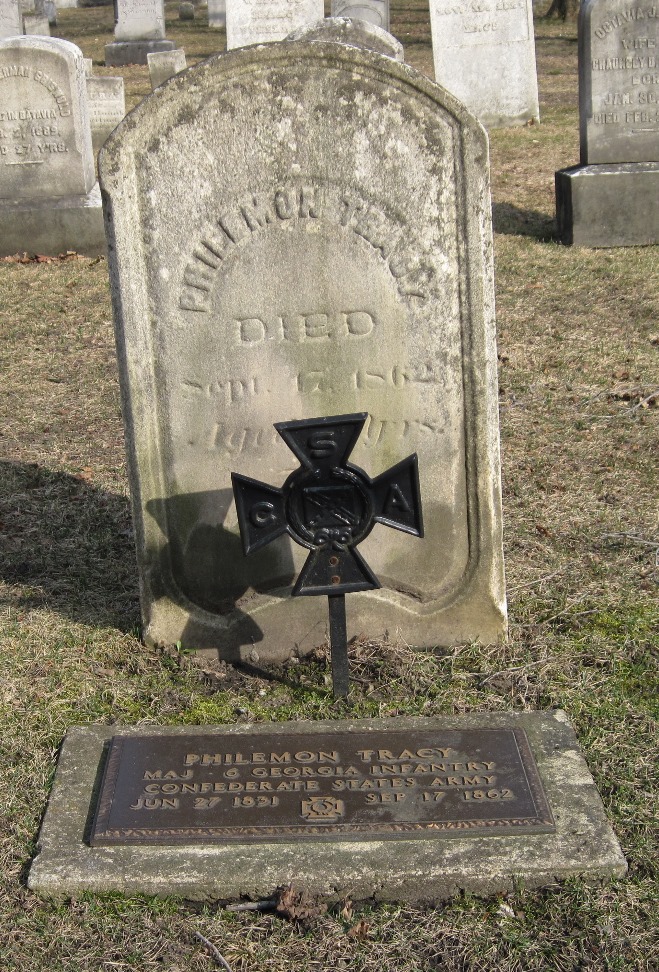A Rebel Far From Home
BATAVIA — A little Confederate battle flag caught my eye as I drove down Harvester Avenue next to the historic Batavia Cemetery in upstate New York a few years ago. I can remember thinking, “No, it must be a prank. We are too far north.” Of course, I had to stop.

It was no joke, as I soon found out. The bronze military plaque read “Philemon Tracy.” A Major in the 6th Georgia Infantry, Tracy died in 1862 — during the war. The domed tablet stone standing behind told me little more. This was a mystery I stood and pondered for some time. “What is he doing here if he was from Georgia?” Then the modern world intruded rudely. Beckoned away by the cares of my world, I was resolved to return to the mystery.
As with so many things, the best of intentions sometimes affords little. However, the mystery was thrust upon me again in an unexpected way. The Batavia Cemetery Association was hosting its semi-annual fundraiser – a ghost walk – and the man who normally played the part of the ghost of Philemon Tracy was ill and could not be there. One of the most famous graves in the cemetery, the organizers really wanted someone to play that particular part. I was happy to help, I told them, but I did not have a Confederate Major’s uniform. After searching in vain to borrow one from one of my many reeanctor friends, I offered another alternative: I would play the part of Tracy’s uncle Phineas Tracy – a distinguished gentleman of the day. The garb of a Victorian gentleman I did have. I would play the part of the uncle who would tell the story of his nephew; a good compromise, I thought. They agreed.

In preparation for my part, I had the opportunity to unravel the mystery finally. Born in 1831 near Macon, Georgia, Philemon Tracy often spent summers visiting his uncle Phineas in Batavia, NY, to escape the heat of the deep south that time of year. Phineas Tracy was something of an idol to his young nephew. Born in Connecticut, Phineas graduated from Yale in 1806 and entered the law. He removed to the frontier around 1815 and prospered. An anti-Mason candidate for Congress, Tracy was elected to the House of Representatives. Later he was appointed the presiding judge of the Genesee County Court and continued in that capacity until he retired in 1846.
Philemon followed his uncle’s example and entered Yale University before returning to Macon where he became editor of the Macon Telegraph for a time. Later he worked in a law firm and was elected to the Georgia State Senate. Professionally, all was clear sailing for Tracy. Personally, as things would develop, life took dimmer turns. One such turn was the tragic loss of his wife Carrie, and the infant she had just delivered.
When the war came Tracy promptly joined the 6th Georgia Infantry. In the spring of 1862 he was with Gen. Joseph Johnston’s army in Virginia, where he was wounded at the Battle of Seven Pines, in the shadow of Richmond. Hit in the face, leg and hip, he was out of action for quite some time. He returned to Georgia to recover.
In September 1862 Tracy heard rumblings of Gen. Lee’s intention to invade the north. Having also fallen at Seven Pines, Gen. Johnston’s command had been turned over to Robert E. Lee, who styled his army the Army of Northern Virginia. Tracy raced north to join Lee and his men.
Tracy arrived at Sharpsburg, Maryland on the evening of Sept. 16th, where Lee’s army was concentrating. Facing them for the impending conflagration was Union Maj. Gen. George McClellan and the Army of the Potomac. When the action opened early the next morning, Tracy was among the first to fall. He was struck by a bullet in the thigh, severing the femoral artery and was soon dead. He would be buried on the battlefield.
Word of his nephew’s fate at the Battle of Antietam reached Judge Phineas Tracy in Batavia soon after the battle. Wasting no time, he rushed a team to Maryland to find and recover Philemon’s body, which was laid to rest quietly in the Batavia Cemetery. Phineas was worried that Union-minded folks might take exception to having a rebel in their midst, so he took pains to hide the facts from neighbors. In 1876, Phineas himself would come to rest just yards away from his Confederate kin.
Great story, Prof. Maxfield! I am very familiar with Major Tracy’s final resting places as the first event I did as a Union Army reenactor was the rededication of Major Tracy’s grave in 1989. We gathered, both Union and Confederate reenactors to hoor a man who fought and died for what he believed. Now, years later, when I am in Batavia I usually try to stop by to pay my respects to Philemon Tracy.
Just lovely. Thanks for your interpretation of this tragedy–tiny in the scope of things, but not so to those who loved him.
Nice Job Derek, love the fact you persevered and researched to find the details about the soldier.
I love this account of Philemon and his uncle Phineas. It is a beautiful picture of familial love overshadowing politics and sides drawn up for battle…
Very interesting how peoples’ lives cross. But there has to be more to the story. How did Philemon come to reside in Georgia? What persuaded him to join the Confederate army with roots so deep in the North and having attended Yale? The account given here is historical; is a more human account available from family documents? i suspect it is, Philemon having been a Macon Telegraph editor. I encourage Professor Maxwell to give us the “rest of the story.”